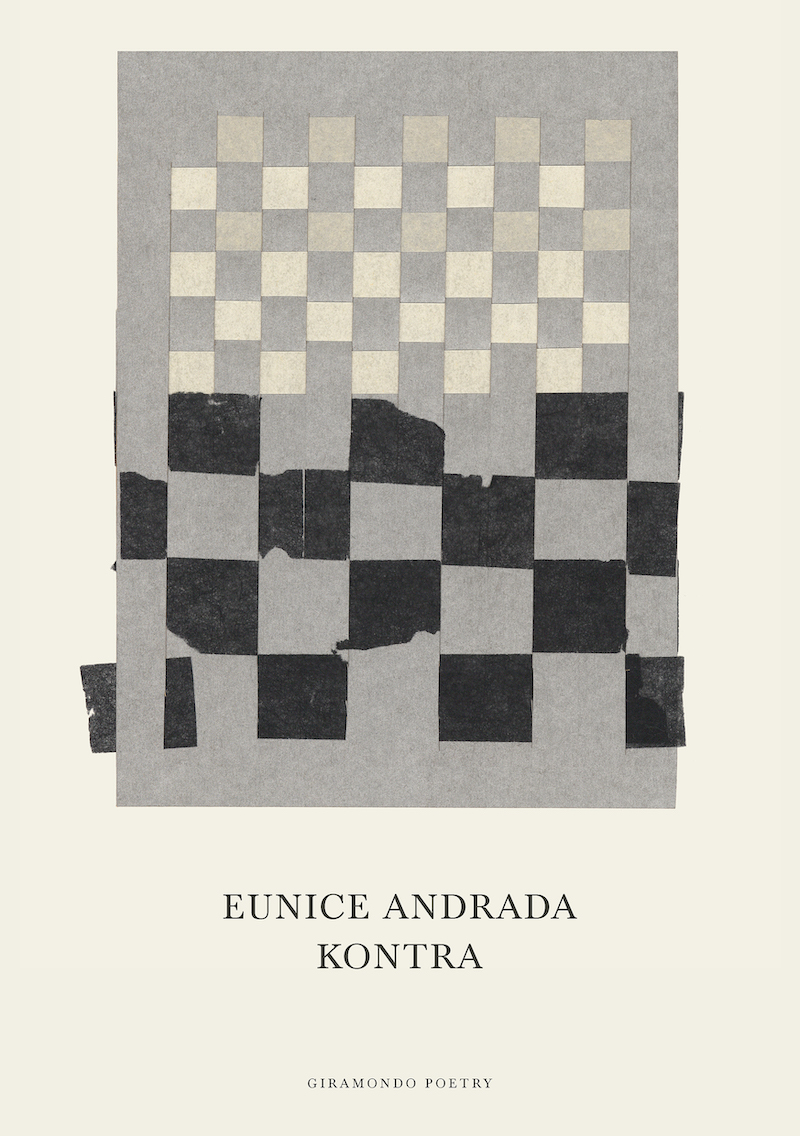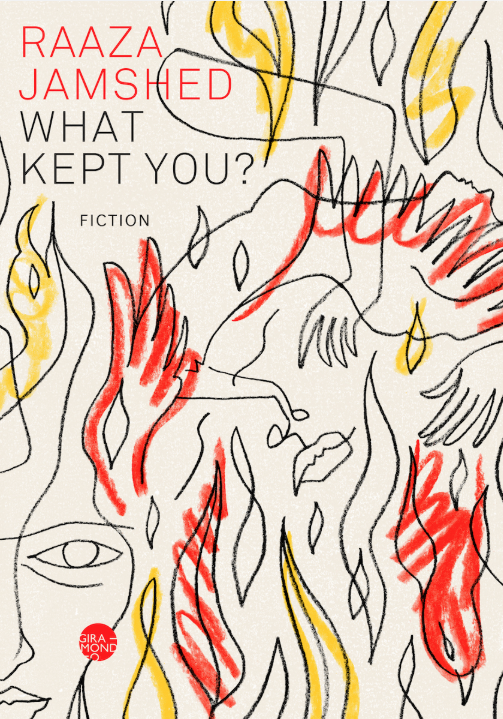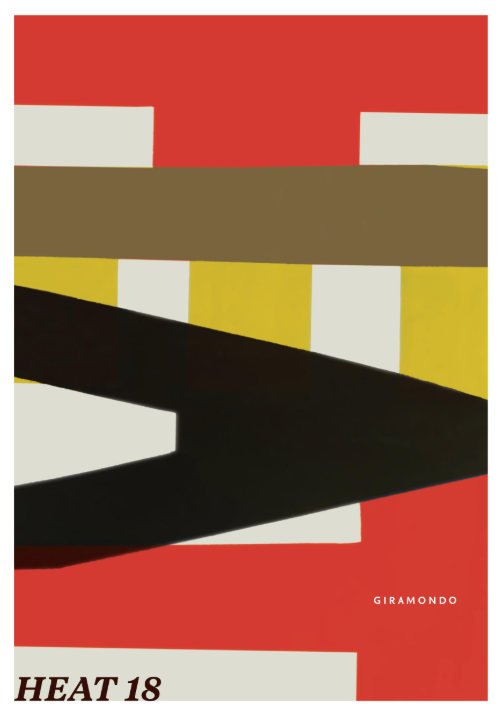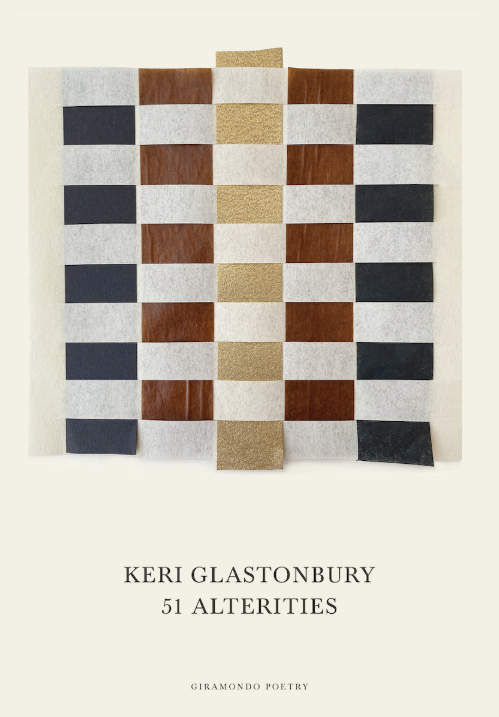Book reviews
Book reviews
Giramondo Publishing
By on
Book title: KONTRA by Eunice Andrada

Reviewer: Neen Ramos
Eunice Andrada’s KONTRA is a masterstroke – a book that refuses, seduces, and cuts through the air like a voice that’s had enough of being polite. Centring the kontrabida, the so-called villainess of Filipino teleseryes (soap operas), Andrada reclaims the woman who’s always punished for wanting and refusing to behave. The poems move between the poet and the persona until those lines blur completely. The result is a work that feels alive, daring, and devastatingly precise.
The concept alone is thrilling, but it’s the execution that makes this book extraordinary. Andrada doesn’t tidy up the kontrabida or turn her into a misunderstood heroine. She lets her stay complicated – proud, hungry, unrepentant. The poems invite readers to sit with that discomfort, to see what happens when women stop performing goodness and start speaking plainly.
The language is deliberate and alive. Every word feels placed with intent. There’s glamour, violence, humour, and ache in equal measure. The pop-culture references – teleserye lines, old insults, familiar snacks – both decorate and anchor the poems.
For those of us who grew up with those worlds, this recognition is electric. You can almost hear the living room TV in the background, the aunties reacting to every twist. It’s that rare book where you keep turning pages because every poem feels like Easter eggs whispered in your own language. KONTRA doesn’t chase likeability. It’s not trying to explain itself. It stands where it stands – in lineage, in history, in refusal – and that certainty gives it so much power. It’s a collection that understands its own significance.
Because the book moves between personas and perspectives, it can feel disorienting at first. Some poems sit deep in cultural context and may lose readers unfamiliar with those references. But that’s also the point. Andrada writes from a specific lineage and doesn’t translate herself for anyone. Readers expecting a clear arc might find themselves working harder to piece it together. Yet the lack of neat resolution fits the work. Refusal doesn’t always have closure.
KONTRA is fearless. It’s tender and furious in equal measure, a book that refuses to shrink for anyone. Andrada writes like someone who knows exactly what she wants to say, and she says it without flinching.
For readers who share her cultural touchstones, the experience is intimate. For everyone, it’s a lesson in how poetry can hold its ground. Every page hums. Every word lands. This collection radiates strength that proudly showcases Andrada's rich heritage and distinct perspective in contemporary Australian poetry.
Loved reading about KONTRA? Imagine the impact of helping a child discover their first favourite book.
By supporting Booktober, you’re helping the next generation in Western Sydney and regional NSW find their voice - and maybe even write the books you’ll be reading in the future.
Donate today at booktober.org.au/donate
Or Support a Bookworm like Neen at booktober.org.au/users/neen-ramos
Reviewer’s bio:

Neen Ramos is an emerging poet residing on Dharug land. Her body of work explores the complexities of the immigrant experience. With a background in marketing, Neen brings a thoughtful and layered approach to storytelling, weaving themes of resilience, displacement, and belonging into her poetry and creative nonfiction. Her writing invites readers to reflect on the nuances of language, the quiet sacrifices of migration, and the vibrant yet bittersweet ties to home. She is currently developing a poetry collection, gods of the margins, which navigates the liminal spaces of cultural identity, colonial inheritance, and the act of becoming in a new land. Through this work, she explores what it means to write from the edges—linguistically, politically, and emotionally—while reclaiming space and voice.
Book title: What Kept You? by Raaza Jamshed

Reviewer: Dr. Benjamin D. Muir
It’s going to be very difficult to review this adequately in seven-hundred words or less, but I’ll attempt, nevertheless. This warrants study, more so than mere review.
I’ve been aware of Raaza Jamshed’s prowess as a writer for many years now, having studied together as graduate research students some years ago. I knew when I picked up this book that it was going to be good, but I had no idea precisely how impressive it would be. Various writeups have located the work as a one of diasporic fiction, feminist treatise, and as a rumination on grief and loss. It would not be incorrect to categorise it thusly, but neither individually, nor as a trifecta do they do justice to the sprawling epic that Jamshed has laid out. It is a cliché to call a work “greater than the sum of its parts,” but it’s hard to express it any other way.
Jamshed is a phenomenal stylist, and her previous work as a poet is apparent even as she works in prose. What’s remarkable, however, is her consistency as a stylist: while it’s not the longest novel, to maintain the highly technical momentum that flows in every line, on every page, for the duration of its length is truly a marathon effort. The prose is lush, accomplished, and moreover, self-reflexively concerned with language itself, punctuated by words and phrases in Urdu, Arabic, and occasionally others. These do not, however, feel forced in any way, and often are brought to life through artful translation and transliteration that blends seamlessly with the narration, thereby avoiding the all-too-common faux pas of multilingual sections feeling forced, or tokenistic. The leitmotif of “these are not our stories,” which serves as a refrain throughout draws a stark contrast between the stories, often involving “named fears,” of mythological, historical, and socio-political varieties that protagonist Jahan’s Nani proffers, and the neater narratives that her mother prefers. In some ways, the book might be read as Jahan’s journey to ultimately integrate the narratives shaping her life, both told and lived, into something that is hers.
What Kept You? is written predominantly in the second person, addressing protagonist Jahan’s Nani, whom she’s not seen in ten years, and who passed six months prior. Jahan is instructed to write letters to her Nani, and then burn them, but rather than setting them alight in the literal sense, they form the basis of the novel – however, as the fire looms, it threatens to take more than just the letters with it. The novel oscillates between Jahan’s youth in Pakistan, and her later life at the foot of the Blue Mountains as catastrophic bushfires close in on her and her husband’s property, and the horses they keep there. While these are the two predominant narrative threads, these are punctuated by stream of consciousness diversions into memory, which render them effectively nonlinear despite each narrative thread being (roughly) chronological. This modernist exercise in memory might, in the hands of a lesser writer, prove confusing or diversionary, but despite the technicality, What Kept You? is very readable. It successfully walks the razor-thin line between experimental achievement and being an absolute page-turner. It wouldn’t be accurate to describe it as a “plot-forward” novel, but the plot is compelling, and the continual joy of reading the intersections of form and content that What Kept you? is comprised of makes for an immensely rewarding experience, even though it is, at times, utterly heart-rending.
Despite how hooked you will be, however, do not make the mistake of expecting a clean resolution. Despite the poetry and myth that intertwines with the real throughout, as in the broader modernist tradition, Jamshed’s departure from dry realism inadvertently imparts a kind of hyperrealism that conveys the subjectivity of individual thought and experience well beyond the literal events taking place. However, as in the real and the subjective, neither grief, nor romance, nor the passing of events necessarily wrap up neatly. There is a very real sense of progress, and of movement, but not of conclusion.
This is a phenomenally impressive entry into the canon of Australian fiction, and a landmark debut. As Meldrum would say, “Do yourself a favour.”
Loved reading about What Kept You? Imagine the impact of helping a child discover their first favourite book.
By supporting Booktober, you’re helping the next generation in Western Sydney and regional NSW find their voice - and maybe even write the books you’ll be reading in the future.
Donate today at booktober.org.au/donate
Or Support a Bookworm like Benjamin at booktober.org.au/users/benjamin-muir
Reviewer’s bio:
Benjamin D. Muir is a reformed juvenile delinquent born in and writing on unceded Dharug land (Penrith). He is a prize-winning writer, casual academic, teacher, researcher, and six-time failed metalcore musician. His novel, The McMillan Diaries, forthcoming from Kith Books in 2024, was the recipient of the 2019 AAWP/UWAP Meniscus Chapter One Prize. His work has appeared in SBS Australia, Studio Stories via FBI Radio’s Or It Didn’t Happen, Antipodean Science Fiction, The Conversation, Affirmations: of the Modern and several anthologies.He holds a doctorate from Western Sydney University, where he teaches literature and creative writing. His thesis was on depictions of grief and trauma in Mark Z. Danielewski’s House of Leaves.
Book title: HEAT Series 3 Number 18

Reviewer: Blaire Jakobs
HEAT is a literary journal from publisher Giramondo. The eighteenth issue of HEAT's third series features work contributed by Lena Andersson, π.O., Fiona Kelly McGregor, Leah Muddle, Debbie Lim, and Hannah Fink. This issue of the magazine contains a small variety of writing, from short fiction to essays to poetry.
I was unfamiliar with π.O.'s previous work. When I came across his name, I thought it was interesting as it was an ancient Greek symbol. How could a symbol write poems? But as Fiona Kelly McGregor asked in her essay, just a few pages on, ‘What’s in a name?’
I first googled π.O. and discovered that he has lived quite a well-documented and decorated creative life as a Greek-Australian migrant and anarchist poet in Melbourne. Melbourne, the same place where I had worked and studied in my early twenties. π.O. spoke to an old version of me, as I sat and flicked through the pages of his collection from my Sydney apartment.
In his five poems, π.O. details life in the inner city Melbourne suburb of Fitzroy. He references street names and landmarks that I myself had frequented in the past with a soy cappuccino in hand. “Sam Napoleon” stood out to me. It is a poem about an old man who sits lonely and reads the paper in the barber shop he owns on the corner of Palmer & Brunswick St. I was reminded of a different man from my past who ran a corner store, just a few suburbs away from Fitzroy in Northcote. “Sam Napoleon” slowed me down to a relatively irrelevant and particular moment in my own life, where I had overlooked the man at the corner store. π.O.’s very specific poetry had an incredibly universal quality that made me look back and reconsider and see value in people that I had known, spoken to or just simply observed in Melbourne.
Good writing can bring you face-to-face with yourself or those you might have forgotten. π.O.'s poetry is a must-read for anyone, but especially those with a connection to Melbourne's northern suburbs. And even someone who was not familiar with Melbourne’s grid system and all the kinds of people who live there will still be able to find something to latch onto in Debbie Lim's great poems, or in any of the other pieces in HEAT 18.
This magazine was a truly insightful and pleasant read. My one gripe with it might be that it was a bit too short. There can never be too much of a good thing. The Australian literary scene is seeing some serious setbacks in recent days. With every new headline that comes out about literacy levels, and journals as old as the scene itself inexplicably shutting down, it's magazines like HEAT that bring the people more of what they need: singular and memorable stories that speak beyond words and that stir the heart.
Loved reading about HEAT? Imagine the impact of helping a child discover their first favourite book.
By supporting Booktober, you’re helping the next generation in Western Sydney and regional NSW find their voice - and maybe even write the books you’ll be reading in the future.
Donate today at booktober.org.au/donate
Or Support a Bookworm like Blaire at booktober.org.au/users/blaire-jakobs
Reviewer’s bio:

Blaire Jakobs is an emerging writer based on Gadigal land, originally from Gumbaynggirr Country on the Mid North Coast. He has a professional background in content writing and is part of the WestWords writing program Illuminated Ink. Blaire is focused on developing short fiction and working on his novel manuscript.
Book title: 51 Alterities by Keri Glastonbury

Reviewer: Ronald Araña Atilano
In 51 Alterities, Keri Glastonbury has written a series of poetic commentary—at times sardonic, humorous, and elegiac—on 21st-century culture in our age of hyperrealist social media, crypto-currencies and ‘tech bro’ empires. Referencing Sam Riviere’s 81 Austerities, the poems read like a postmodernist soliloquy on Australian intellectual life, this rhapsodic landscape of Antipodean alienation which Glastonbury endearingly calls ‘the republic of letters/…a veritable la la land’.
Indeed, this sense of alienation, or ‘otherness’, is metaphorically echoed in the structure and sequencing of the poems, each of the four chapters signposted by asterisks instead of titles or numbers, as though encyclopaedic footnotes (or emojis?) to a compendium of oddities. And through these surrealist observations runs the ethereal thread of technology pervading our waking lives: AI and the internet, smartphones, Netflix, social media. While the poems are all untitled and self-contained within a page (reminiscent of numbered Shakespearean sonnets), the first lines appear as bracketed titles in the table of contents, like carefully arranged thumbnails of Instagram posts.
For all their accounts of irreverent ponderances and virtual misadventures, these poems are unmistakably grounded in the Australian landscape: the town centre where ‘red dust creates a henna effect in your silver hair’, an outdoor escape ‘soaking in a cast-iron tub/ by the spectral gum’, ‘a train in Epping / perilously snaking’. And flitting in and out of these scenic stages is a revolving door of celebrities, cultural luminaries, historical, literary and cinematic figures—Les Murray, John Waters, ‘O’Hara and Jorie Graham’, Bindi Irwin, Bon Iver, Martha Wainwright, RuPaul, The Man from Snowy River, Taxi Driver—a cast of intertextual actors paraded on cue, delivering their familiar but altered lines.
In the poem [the monument has no plaque], for instance, sculptures and monuments in the Newcastle Civic Park become ‘long-forgotten aldermen’, losing all their original meaning and significance, the sculptor Margel Hinder and her fountain relegated to invisible footnotes in a public memory more enraptured with ‘Elon Musk on Mars’ and with ‘Ethereum…should be one of ours’ as the new morality.
There is an obliqueness, at times opaqueness, in the tone and syntax of the poems, a fragmentation in the poetic structure that eschews a linear narrative or revelation. This, ironically, organically serves the sentiment of the project, reflecting the chronic unintelligibility that permeates these contemporary times. But in the middle of this forest, we walk into lyrical clearings such as this, a square glimpse of the night sky in meditative tercets:
three weeks in a twinkling town
enough for city lights
out the plane window to be defamiliar
the Luna Park face soothing and terrifying
the child in me all that out there
the maleficent cloak I wear
The final chapter (****) disperses into longer poems that almost resemble that of a long continuous poem, or a long confessional letter for that matter, with a final salutation riffed from Leonard Cohen’s ‘Famous Blue Raincoat’, a fitting finish to these 51 postmodernist arias of love and hate.
Loved reading about 51 Alterities? Imagine the impact of helping a child discover their first favourite book.
By supporting Booktober, you’re helping the next generation in Western Sydney and regional NSW find their voice - and maybe even write the books you’ll be reading in the future.
Donate today at booktober.org.au/donate
Or Support a Bookworm like Ron at booktober.org.au/users/ronald-atilano
Reviewer’s bio:

Ronald Araña Atilano is a Filipino-born poet who lives in Awabakal land in Lake Macquarie, NSW. His works have been featured in the Rabbit Poetry Journal, Westerly Magazine, Island Magazine Online, amongst others. ‘New Ordinance for the Dead’, his bilingual book of poetry in English and Filipino, will soon be published by Flying Islands.
